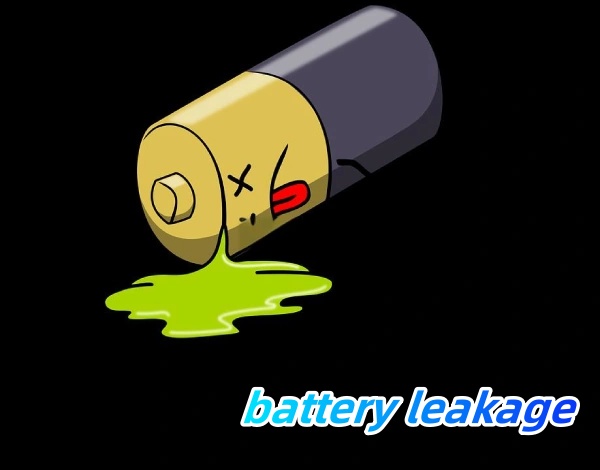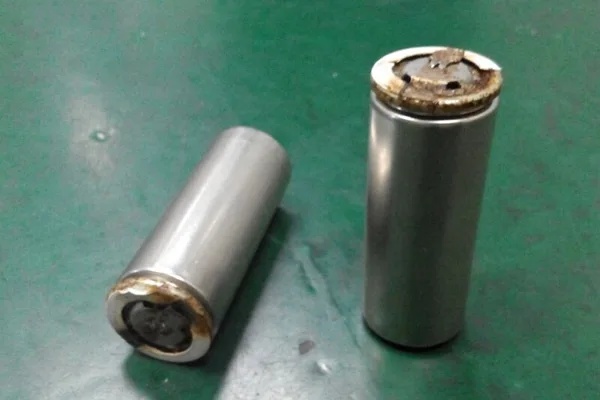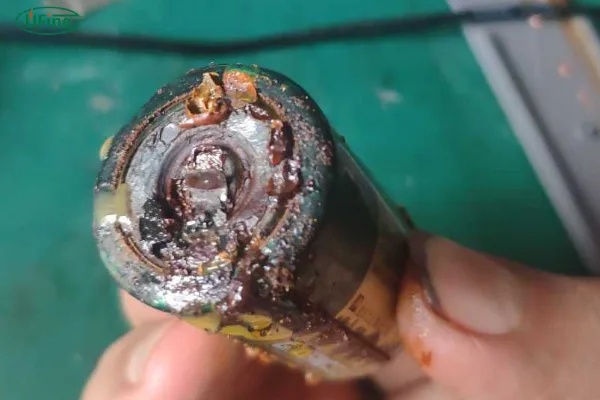리튬 배터리가 누출됩니까??
대답은 배터리 누출 가능성이 적다는 것입니다..
리튬 이온 배터리는 많은 일일 장치에서 필수 불가결 한 에너지 공급원이되었습니다., 스마트 폰 및 전기 자동차와 같은. 사람들은 일반적으로 사용 중에 리튬 배터리 누출에 대해 걱정합니다..
이 기사에서는, 리튬 이온 배터리의 누출 문제를 해결할 것입니다., 원인을 포함하여, 영향, 안전한 사용을 보장하기위한 예방 조치.
부분 1. 리튬 배터리 누출이란 무엇입니까??

배터리 누출은 배터리 케이싱이 파열되는 상황을 나타냅니다., 내부 전해질이 누출되게합니다. 전해질은 부식성 및 가연성 화학 혼합물로 피부 또는 가연성 물질과 접촉 할 때 위험을 초래할 수 있습니다..
배터리 누출을 일으킬 수있는 많은 상황이 있습니다, 제조 결함과 같은, 부적절한 사용, 또는 단락, 배터리 또는 생산 결함에 대한 물리적 영향을 포함합니다.
리튬 이온 배터리는 양극과 음극 사이의 리튬 이온의 움직임을 통해 에너지를 저장하고 방출하는 충전식 전원입니다.. 이 유형의 배터리는 일반적으로 양의 전극으로 구성됩니다., 음극, 전해질.
리튬 이온 배터리가 누출되면, 전해질 증발과 같은 문제가 발생할 수 있습니다, 물 침투, 배터리 확장. 이러한 문제는 배터리의 성능을 줄일뿐만 아니라, 그러나 심한 경우에는 화재 나 폭발로 이어질 수도 있습니다..
부분 2. 배터리가 누출되는 이유?

리튬 이온 배터리는 일반적으로 누출이 발생하지 않습니다, 그러나 특정 조건 하에서, 누출이 여전히 발생할 수 있습니다.
액체 누출의 가능한 원인은 다음과 같습니다:
물리적 손상
배터리에 물리적 손상이있는 경우, 외부 충격 또는 압축과 같은, 또는 피어싱하거나 변형 될 수 있습니다, 쉘의 무결성을 손상시키고 배터리 누출을 유발할 수 있습니다..
배터리에 물리적 손상이있는 경우, 외부 충격 또는 압축과 같은, 또는 피어싱하거나 변형 될 수 있습니다, 쉘의 무결성을 손상시키고 배터리 누출을 유발할 수 있습니다..
이 테스트는 배터리의 내구성과 손상을 견딜 수있는 능력을 평가하는 데 사용됩니다.. 평판이 좋은 브랜드 선택, ~와 같은 GycxSolar, 배터리가 더 강한 유출 성능을 제공하고 투자 비용을 보호 할 수 있습니다..
제조 품질
품질이 좋지 않은 제조 공정, 부적절한 밀봉 또는 배터리 구성 요소의 부적절한 조립과 같은, 품질 문제가 발생하여 궁극적으로 배터리 누출로 이어질 수 있습니다..
그러므로, 리튬 배터리를 선택할 때, 평판이 좋은 제조업체를 선택하는 것이 중요합니다. gycxsolar의 LifePo4 리튬 배터리는 UL을 포함한 여러 인증 테스트를 통과했습니다., FCC, CE, RoHS 규제, 및 UN38.3.
부적절한 사용
배터리의 부적절한 사용, 과충전 또는 배출과 같은, 배터리가 손상 될 수 있습니다, 내부 분리기를 손상시키고 배터리 유체 누출로 이어질 수 있습니다..
리튬 배터리가 과충전 된 경우, 과열 및 압력 축적을 유발할 수 있습니다. 배터리 품질이 이러한 상황을 효과적으로 제어 할 수없는 경우, 누출로 이어질 수 있습니다.
환경 영향
배터리가 오랫동안 습한 환경에 보관 된 경우, 내부 단락을 유발할 수 있습니다, 배터리 유체 누출로 이어질 수 있습니다.
리튬 배터리가 오랫동안 고온 또는 극한 온도에 노출되는 경우, 내부 전해질이 손상 될 수 있습니다, 배터리 누출 위험이 높아집니다. 따라서 시원하고 건조한 장소에 리튬 배터리를 저장하는 것이 매우 중요합니다..
GYCXSolar의 스토리지 가이드 라인에 따라 배터리 누출 위험을 최대한 활용할 수 있습니다..
배터리 노화 및 배터리 액세서리의 영향
배터리가 오랫동안 또는 고주파수로 사용되므로, 점차적으로 나이가 들며 내부 화학 성분은 점차적으로 용해됩니다..
내부 재료의 안정성 감소는 배터리 성능의 감소와 심지어 누수가 발생할 수 있습니다..
배터리가 분해되거나 부적절하게 수정 된 경우, 배터리의 내부 구조를 손상시키고 누출을 유발할 수 있습니다..
원래의 배터리 액세서리 사용, 충전을위한 열등한 충전기와 같은, 고전압과 전류로 인해 배터리 과열 및 누출이 발생할 수 있습니다..
부분 3. 누출이 발생하기 쉬운 배터리 유형
리튬 이온 배터리는 강력한 전력을 제공 할 수 있습니다, 그러나 충격 또는 부적절한 작동에 노출되면 파손 및 배터리 누출이 발생하기 쉽습니다..
리튬 폴리머 배터리는 다른 전해질을 사용하며 일반적으로 의료 기기 및 전자 담배에 사용됩니다.. 리튬 이온 배터리처럼, 그들의 취약성으로 인해, 손상되거나 파손되면 누출 될 수 있습니다.
어떤 유형의 리튬 배터리가 누출되기 쉬운지?
다양한 유형의 리튬 배터리 중, 리튬철인산염 (LiFePO4) 배터리는 누출이 가장 적은 것으로 간주됩니다. 그들은 내부 구조의 전해질에서 코발트 대신 철을 사용하기 때문에.
하지만, 다른 충전식 배터리에 비해, 전력 출력과 수명은 일반적으로 짧습니다.
최신 혁신은 리튬 황 배터리입니다. 이러한 유형의 배터리는 제조 공정에서 리튬 대신 황을 사용하기 때문에 환경 친화적입니다..
다른 리튬 배터리에 비해, 누출 위험은 상대적으로 낮습니다.
구체적인 비교를 위해, 이 기사를 gycxsolar의 참조하십시오: 리튬 황 배터리 대 리튬 이온 배터리 - 선택 방법

부분 4. 리튬 배터리 누출의 잠재적 위험은 무엇입니까??
전자 장치 손상
리튬 배터리 누출이 부식성 일 때 방출되는 전해질은 전자 장치에 손상을 줄 수 있습니다.. 이 부식은 장비 오작동 및 비가 역적 손상을 유발할 수 있습니다..
화재 및 폭발의 위험
리튬 배터리에는 리튬 및 유기 용매와 같은 고도로 활성 및 가연성 물질이 들어 있습니다.. 배터리가 누출되면, 리튬은 수분 또는 기타 활성 물질과 접촉합니다..
누출 된 전해질이 가연성 물질과 접촉하는 경우, 화재 나 폭발을 일으킬 수 있습니다.
리튬 배터리의 누출은 또한 열 런 어웨이를 유발할 수 있습니다, 그리고 축적 된 열은 자발적인 연소 또는 배터리의 폭발로 이어질 수 있습니다..
배터리가 단락이 발생하거나 고온에 노출되어 손상된 경우, 이 상황은 특히 위험합니다.
리튬 배터리가 누출되어 장비에서 단락을 일으키는 경우, 장비 고장과 전기 안전 위험이 발생합니다.
손상된 장비를 계속 사용하면 작동을 멈출 수 있습니다., 매우 안전하지 않습니다. 화재 및 감전과 같은 위험이있을 수 있습니다..
화학적 위험
독성 문제:
리튬 배터리에는 전해질 및 기타 화학 물질이 포함되어 있습니다, 리튬 염과 같은, 유기 용매, 그리고 어떤 경우에는 중금속이 생산됩니다. 누출이 발생하는 경우, 이 물질은 인간 건강에 위협이 될 수 있습니다.
이 화학 물질과 직접 접촉하면 피부 자극이 발생할 수 있습니다, 화학 화상, 또는 더 심각한 건강 문제.
연기와 증기:
유출 된 리튬 배터리는 유해한 가스와 증기를 방출 할 수 있습니다, 히드로 플루오르 산과 같은 (HF) 및 기타 휘발성 유기 화합물 (voc), 흡입시 독성이있을 수 있습니다.
이 연기에 대한 장기 노출은 호흡기 자극과 폐 손상을 유발할 수 있습니다..
이러한 위험을 최대한 최소화합니다, 리튬 배터리를 조심스럽게 처리하십시오.
평판이 좋은 공급 업체로부터 고품질 배터리를 구매하고 올바른 충전 및 사용 지침을 준수하는 것이 중요합니다..
배터리 누출이 발생하는 경우, 적절한 보호 장비를 착용해야하며 안전을 보장하기 위해 올바른 청소 및 폐기 절차를 따라야합니다..
건강에 해를 끼치는 것:
스킨과 눈 자극:
누출 된 배터리 전해질이 피부 나 눈과 직접 접촉하는 경우, 화상을 유발할 수 있습니다, 짜증나게 하는 것, 또는 심각한 부상, 특히 전해질에 수중 플루오르 산 또는 기타 부식성 성분이 포함 된 경우.
② 홍수 시스템 문제:
배터리가 새어 생성 된 연기 흡입 배터리는 폐 및 호흡기에 자극을 줄 수 있습니다..
독성 가스에 노출되면 더 심각한 건강 문제가 발생할 수도 있습니다., 호흡 곤란 또는 폐 손상과 같은.
부식성 물질의 위험:
리튬 배터리의 전해질은 일반적으로 부식성입니다. 누출이 발생하면, 품목의 표면을 손상시키고 금속을 부식시킬 수 있습니다., 또한 화학 화상을 유발하고 신체에 해를 끼칩니다..
그러므로, 유출 된 전해질과 직접 접촉하지 않고 적절한 안전 예방 조치를 취해야합니다..
환경 위험
토양 및 수질 오염:
리튬 배터리의 화학 물질 인 경우 (리튬 염 및 기타 독성 물질과 같은) 제대로 처리되지 않습니다, 그들은 토양과 물에 빠질 수 있습니다.
이러한 유형의 오염은 야생 동물과 전체 생태계에 위협이 될 수 있습니다., 인간 식수원에도 영향을 줄 수도 있습니다.
유해 폐기물 처리:
유출되거나 손상된 리튬 배터리는 유해 폐기물로 관리하고 관련 규정에 따라 안전하게 폐기되어 환경에 대한 추가 손상을 방지해야합니다..
부분 5. 리튬 배터리를 확인하는 방법이 누출 중입니다?

리튬 배터리가 새는 지 확인합니다, 검사를 위해 아래 단계를 따르십시오:
시각적 관찰
배터리를주의 깊게 관찰하고 누출의 명백한 징후를 찾으십시오., 젖은 반점과 같은, 색상 변화, 또는 케이싱의 잔류 물.
냄새 테스트
배터리 주변의 비정상적인 화학 냄새에 대한 냄새.
누출 리튬 배터리는 눈에 띄는 자극적 인 냄새가 나올 수 있습니다., 누출 신호입니다.
연락처를 확인하십시오
배터리의 접점 또는 터미널의 부식 또는 비정상적인 물질을 확인하십시오., 누출이 배터리 연결에서 부식성 물질을 형성 할 수 있습니다..
장비의 비정상 사용
리튬 배터리로 구동되는 장치가 비정상적이거나 불안정한 작동을 경험하는 경우, 성능에 영향을 미치는 배터리 누출의 징후 일 수 있습니다..
배터리 성능 모니터링
배터리의 성능 변경에주의하십시오. 배터리 수명이 크게 단축되거나 전력 소비 속도가 비정상적으로 빠릅니다., 배터리 용량에 영향을 미치는 유출로 인한 것일 수 있습니다..
리튬 배터리의 누출은 정상적인 사용에서는 일반적이지 않습니다.. 그러나 위의 검사에 따라 리튬 배터리가 누출 될 수 있다고 의심되는 경우, 적절한 안전 예방 조치를 취하고 배터리를주의해서 처리해야합니다..
누출에 대한 기기 감지 방법:
helium 검출 방법
리튬 배터리에 헬륨 가스를 주입 한 다음 질량 분석기를 사용하여 헬륨 가스를 감지합니다..
질량 분석기가 헬륨의 존재를 감지 할 수있는 경우, 그것은 일반적으로 배터리에 누출 문제가 있음을 의미합니다..
volatile 유기 화합물 (voc) 발각
휘발성 유기 화합물의 농도를 검출합니다 (voc) 광 이온화 센서를 통해 리튬 배터리 누출 중에 방출됩니다 (PID).
VOC 감지는 작은 누출점을 감지하고 누출 소스를 찾을 수 있습니다..
전해질 조성 분석
전해질의 조성 및 농도 변화를 분석하여, 리튬 배터리가 누출되어 있는지 확인할 수 있습니다..
전해질에 수분이나 불순물이 포함 된 경우, 배터리 누출을 나타낼 수 있습니다.
stress 테스트 방법
리튬 배터리를 밀봉 된 컨테이너에 넣고 컨테이너 내부의 압력 변경을 모니터링합니다.. 배터리가 새는 경우, 압력 판독 값이 바뀔 것입니다.
이 방법은 전문 테스트 장비를 완료해야합니다.
wemperature 모니터링
충전 중에 리튬 배터리의 온도 변화를 모니터링하여, 배터리가 누출되어 있는지 확인할 수 있습니다.. 배터리 온도가 비정상적으로 상승하는 경우, 누출을 나타낼 수 있습니다.
ultrasonic 테스트
초음파 테스트 장비를 사용하여 리튬 배터리를 검사하면 작은 누설 지점과 내부 결함을 감지 할 수 있습니다..
배터리 누출이 확인되면, 유출 된 리튬 배터리 처리를 위해 이전에 논의 된 지침을 따르십시오..
스스로 처리하는 방법이 확실하지 않은 경우, 전문적인 도움을 구하는 것이 좋습니다, 그리고 gycxsolar는 당신의 충성스러운 도우미입니다.
전체 과정에서, 항상 개인 안전 우선 순위를 정하십시오.
부분 6. 새는 배터리를 청소하는 방법?
리튬 배터리의 심각한 누출을 처리하기위한 표준 처리 단계는 다음과 같습니다.. 이 과정을 배우고 참조 할 수 있습니다:
자신의 안전 보장 우선 순위
개인 안전을 보장하는 것이 가장 중요한 것입니다. 누출 된 액체가 피부 나 눈과 접촉하는 경우, 영향을받는 지역을 충분한 물로 즉시 헹구고 즉시 의학적 도움을 받으십시오..
배터리 누출이 있는지 확인하십시오:
배터리 상자를 확인하십시오
배터리 케이스가 손상되지 않고 손상되지 않은지 확인하십시오. 쉘 손상은 부적절한 설치로 인해 발생할 수 있습니다, 배터리 상자 안에 슬래그를 용접합니다, 또는 섀시 충격.
케이스의 상태를 평가하면 잠재적 인 누출 공급원을 식별하는 데 도움이됩니다..
안전 밸브를 확인하십시오
덮개 플레이트를 제거하고 전해질 누출 징후가 있는지 안전 밸브에 검사하십시오.. 밸브가 열린 위치에 있는지 확인하고 전해질이 배터리로 흐르고 있는지 확인하십시오..
이것은 안전 밸브에 누출이 있는지 확인하는 데 도움이됩니다..
테스트 밀봉 성능
처음 두 단계에서 이상이없는 경우, 씰의 무결성을 평가해야합니다.
배터리를 물에 가압하고 팽창시킵니다, 거품을 관찰하십시오. 거품의 모양은 물개에 문제가 있음을 나타냅니다., 거품이 없으면 씰이 손상되지 않았 음을 나타냅니다..
충전 중에 전해질을 제거하십시오
배터리를 충전하고 전해질 누출을 점검하십시오.
전해질이 발견되면, 추가 누출을 방지하려면 조심스럽게 제거하십시오.
주목: 이전에 배터리가 새는 것으로 판단 된 경우, 이 단계를 진행하지 마십시오. 이것은 매우 위험합니다. 취급 조치를 직접 참조하십시오.
누설 공급원 청소 및 수리:
누출을 방지하고 확산됩니다
적절한 개인 보호 장비를 사용하십시오, 장갑과 고글과 같은, 누출로 인한 추가 피해를 방지합니다.
분리 및 환기
확인 된 안전 조건 하에서, 유출 된 리튬 배터리를 안전한 지역으로 옮기고 가연성 및 기타 유해 물질로부터 멀리하십시오..
유해한 가스의 축적을 방지하기 위해이 지역에서 좋은 환기를 보장하십시오..
누출을 청소하십시오
소규모 리튬 배터리 누출, 건조 석고 또는 특수 흡수제와 같은 적합한 흡수성 재료는 세척에 사용할 수 있습니다..
청소 과정에서, 유출 된 재료와 직접 접촉하지 않도록 적절한 도구를 사용하십시오..
누출 소스를 수리하십시오
누출이 있는지 결정하는 단계에서, 누출 소스가 식별되는 경우, 이 지역은 칼로 조심스럽게 청소할 수 있습니다.
그 다음에, 강력한 배터리 특정 접착제를 사용하여 누출점을 단단히 밀봉하십시오..
폐기물 처리
청소 된 새는 재료와 흡수성 재료를 밀봉 된 용기에 넣어 적절한 취급을합니다.. 지역 규제 요구 사항을 준수하고 이러한 자료를 전문 폐기물 처리 기관에서 처리하는지 확인하십시오..
배터리 누출 위험을 줄입니다, 소비자는 배터리를 구매할 때 평판이 좋은 소스에서 진정한 고품질 배터리를 선택하는 것이 좋습니다..
배터리 누출 문제를 적시에 해결하고 적절한 배터리 품질을 보장하면 잠재적 인 위험을 줄이고 더 안전한 배터리 사용 경험을 제공 할 수 있습니다..
비상 조치
누출 리튬 배터리와 접촉하는 경우, 다음 응급 처치 조치를 따르십시오:
피부 접촉:
잠재적으로 오염 된 의류를 즉시 제거하고 적어도 흐르는 물 아래에 영향을받는 지역을 헹구십시오. 15 분.
적절한 평가 및 치료를 보장하기 위해 의료 지원을 구하십시오.
눈과의 접촉:
흐르는 물이나 식염수로 눈을 몇 분 동안 헹구십시오..
철저한 검사를 위해 즉시 치료를 받으십시오.
연기 및 가스 흡입:
추가 연락을 피하기 위해 가능한 빨리 신선한 공기로 이동하십시오..
호흡기가 방해받지 않도록하십시오. 환자가 호흡이 어려운 경우, 산소를 제공하십시오.
환자가 호흡을 중단하면, 즉시 심폐 소생술을 수행하고 의료 지원을 구하십시오.
음식물 섭취:
실수로 전해질을 삼키는 경우, 입을 물로 헹구고 우유 나 달걀 흰자위를 마신다. (사용 가능한 경우). 구토를 유도하지 마십시오.
적절한 평가 및 치료를 위해 즉시 의학적 치료를 받으십시오.
이러한 응급 처치 조치는 일반적인 권장 사항입니다. 누출 리튬 배터리와 접촉하면, 포괄적 인 평가 및 적절한 치료를 위해 즉시 의료 전문가에게 연락해야합니다..
부분 7. 배터리 누출을 방지하는 방법?

리튬 배터리의 안전한 사용 및 성능을 보장하려면, 다음은 누출을 방지하기위한 몇 가지 조치입니다:
고품질 배터리를 선택하십시오
엄격한 품질 관리 및 안전 표준으로 알려진 평판이 좋은 브랜드에서 배터리 구매.
배터리의 만료 날짜를 확인하고 만료 된 배터리가 누출되기 쉽기 때문에 사용하지 마십시오..
배터리를 올바르게 보관하십시오.
배터리를 시원하고 건조한 장소에 보관하십시오, 배터리 확장을 방지하기 위해 직사광선 및 극한 온도 방지, 파열, 또는 누출.
물이 배터리 내부의 화학 물질과 반응 할 수 있으므로 습한 환경에서 멀리 떨어져 있습니다., 누출을 유발합니다.
배터리를 순서대로 보관하십시오, 전도성 재료와의 접촉을 방지하기 위해 독창적 인 포장 또는 특수 배터리 저장 상자 사용.
과충전 및 깊은 배출을 피하십시오
과충전을 방지하기 위해 배터리 유형과 호환되는 충전기를 사용하십시오..
충전 프로세스를 모니터링하여 장기 충전을 피하십시오.
불안정성과 잠재적 누출 위험을 방지하기 위해 배터리를 완전히 배출하지 마십시오..
배터리를 보호하기 위해주의하십시오
구멍을 피하십시오, 압박, 또는 배터리 케이스 손상을 방지하기 위해 배터리를 떨어 뜨려.
배터리를 처리 한 후, 특히 새는 배터리, 손을 씻고 화학 물질과의 접촉을 피하십시오.
배터리를 정기적으로 확인하십시오
배터리에 정기적으로 손상이나 변형을 확인하십시오, 부식의 징후, 확장, 또는 누출.
비정상적인 동작 또는 모니터링 장치의 성능 저하는 배터리 문제의 징후 일 수 있습니다..
사용하지 않은 장치에 오랫동안 저장된 오래된 배터리 교체.
배터리를 올바르게 폐기하십시오
환경 오염을 피하기 위해 지역 규정에 따라 배터리 폐기.
배터리 재활용 프로그램을 활용하여 배터리의 안전하고 책임있는 처분을 보장합니다..
배터리 박스 또는 배터리 홀더를 사용하십시오
절연을 사용하여 배터리를 별도로 보관하십시오, 오리지널 포장, 또는 안전한 보관을 위해 설계된 배터리 상자 및 홀더.
전도성 재료와의 접촉을 방지하십시오.
짧은 회로를 유발할 수있는 금속 물체에서 멀리 떨어져 있습니다..
배터리 유형을 혼합하지 마십시오
같은 장치에서 다른 유형의 배터리를 혼합하지 마십시오..
알칼리성 배터리와 리튬 배터리 또는 충전식 배터리와 충전식 배터리를 섞어 누출 및 오작동을 피하기.
극한 조건에 노출되지 않습니다
배터리를 매우 차갑거나 뜨거운 환경에 노출시키지 마십시오.. 직사광선을 피하십시오, 극한 온도, 그리고 습도.
제습기를 사용하여 배터리 저장 영역의 습도를 제어하십시오..
이러한 예방 조치를 취하면 리튬 배터리 누출 위험이 효과적으로 줄어들고 배터리의 안전한 사용을 보장 할 수 있습니다..
이러한 예방 조치는 리튬 배터리 누출 위험을 줄이는 데 도움이되지만, 경계를 유지하고 항상 안전의 우선 순위를 정하는 것이 중요합니다..
배터리 누출이 의심되거나 리튬 배터리와 관련된 문제가 발생하는 경우, 가장 안전한 접근 방식은 전문적인 도움을 구하거나 제조업체에 문의하여 안내입니다..
동시에, 리튬 배터리를 구매할 때, 배터리 품질 및 안전 표준을 보장하기 위해 평판이 좋은 제조업체 및 공급 업체를 선택하십시오..
내장 보호 회로가있는 장치, GycxSolar의 LifePO4 리튬 배터리와 같은, BMS가 장착되어 있습니다 (배터리 관리 시스템) 안전한 사용을 보장합니다.
결론
리튬 배터리에는 일반적으로 누출 증명 설계가 있습니다, 그러나 일부 요인은 여전히 누출을 일으킬 수 있습니다.
품질이 좋지 않은 제조, 부적절한 사용, 단락 위험이 주요 원인입니다.
사용자는 리튬 배터리 누출의 위험을 줄이고 이러한 요소를 이해하고 적절한 안전 조치를 취함으로써 장비의 안전한 작동을 보장 할 수 있습니다..
신뢰할 수있는 소스에서 배터리를 구매하는 것을 기억하십시오, 책임감있게 처리합니다, 그리고 리튬 배터리 누출을 방지하고 전반적인 배터리 안전을 유지하는 데 안전 조치를 구현하는 것이 중요합니다..
gycxsolar를 선택하면 구매의 전체 프로세스에주의를 기울여야합니다., 테스트, 그리고 사후 판매 서비스.
